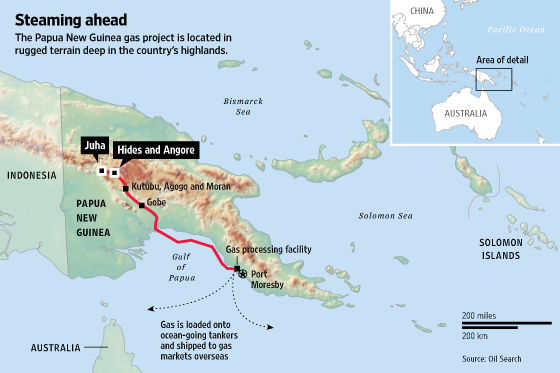
“The risk of it being a mess is high”
 Question: Can you build a $15 billion natural gas plant in a remote, rural, deeply impoverished and corrupt country and not expect any social or environmental problems.
Question: Can you build a $15 billion natural gas plant in a remote, rural, deeply impoverished and corrupt country and not expect any social or environmental problems.
The answer is don’t be silly.
So the news last December that Exxon Mobil and several other energy companies were planning the largest ever foreign-investment project in Papua New Guinea with the multi-billion gas plant can only be greeted with deep scepticism about what benefits it will bring the local community.
Once again it is worth pointing out the hype that surrounds these projects.
This is how the Wall Street Journal reported it last year: “The project has the potential to transform Papua New Guinea, an impoverished South Pacific nation better-known for jungles, violence and corruption, into one of the world’s newest significant energy producers.”
But add the riches of a billion dollar energy project into the vortex of violence and corruption that already plagues the country and you get a potent mix that could go badly wrong.
You only need to go to the Niger Delta to explore how badly any dreams of prosperity and transformation turn into an ugly, dangerous and soul-destroying reality.
How many developing nations are plagued by the resource curse?
Least the Journal did go on to say: “Experts on Papua New Guinea warn about the dangers of doing business there. ‘There are multiple things that could go wrong’ with the Exxon project, says Jenny Hayward-Jones, an expert on Papua New Guinea at the Lowy Institute, a Sydney think tank. ‘The risk of it being like every other mess in PNG is high.'”
The propensity for one hell of a mess is very high. The gas is in a remote mountainous region and must be transported to the coast by a 310-kilometer, pipeline that has to cross a seismically active area, an area where a whopping 60,000 people have land rights.
The issue of how badly things can go wrong is explored in the New York Times today:
“While the West’s richest companies are used to seeking natural resources in the world’s poorest corners, few places on earth seem as ill prepared as the Southern Highlands to rub shoulders with ExxonMobil”
The paper continues:
“The flood of revenue, which is expected to bring Papua New Guinea $30 billion over three decades and to more than double its gross domestic product, will force a country already beset by state corruption and bedeviled by a complex land tenure system to grapple with the kind of windfall that has paradoxically entrenched other poor, resource-rich nations in deeper poverty.”
Local leaders told the paper that they worry that “the benefits of the gas project will fall short of expectations, begetting a generation of young men who will train their anger on ExxonMobil.”
Already angry landowners have forced ExxonMobil’s contractors to suspend work at several construction sites.
And with the sudden rush of petro-dollars will come higher rates of prostitution, alcoholism, polygamy and violence.
“The people here are not ready for that kind of money,” the Reverend Paul Patlo, a Papua New Guinean priest tells the paper.
There will be trouble ahead.
The odds are that many villagers will rue the day that the man for Exxon came knocking at the door.
